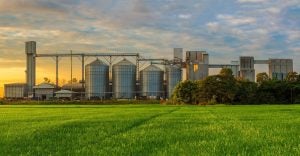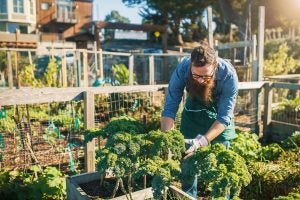Name an existential threat to human civilization. Was (lack of) food sovereignty at the top of your list?
In the developed world, the mere mention of food seems to be taken for granted. We have it in spades. We’ve been blessed with some of the most productive agricultural lands in the world, and the technical know-how to parlay that into a staggering assortment of products.
We fancy ourselves food connoisseurs — and yet many people are far removed from the food chains that produce, package, and distribute our essential earthly “manna.”
Maybe too far removed. An increasingly vocal crowd — food sovereigntists — argue that the grocery aisle is just the final staging ground for an array of “substandard” (borderline toxic) products produced by faceless corporations. Said entities enjoy a vertically integrated, monopolistic stranglehold over the means of production and distribution. And they’re all in cahoots, conspiring to bleed you dry while fatcats profit.

But what’s this notion of food sovereignty?
To me, the term sovereignty conjures up terms like self-determination: the right of a minority ethnic or religious group to chart their own political destiny, free from the watchful eye of a monarch or authoritarian leader.
This autonomy echoes the idea of food sovereignty, except with a distinct sociopolitical tinge. Basically, people should exercise the right to define food systems, and to instill them with their own unique sets of eco-conscious values and production methods, free from corrupting corporate influence.
It’s an emphatic rebuke of traditional power dynamics — a populist uprising to upend the status quo and renegotiate the relationships between humans and the land (from an environmental, cultural, and economic standpoint).
It overlaps significantly with food security, the idea that people should have continual access to adequate, safe, and nutritious food.
So, power to the people?
Hardcore disciples practice “guerilla gardening” — repurposing private, often unused property into lush plantings in the tradition of Johnny Appleseed.
Whether or not this is “sticking it to the man” is questionable, as the lots are simply derelict. Doubtful they’re owned by some corporate juggernaut. Nor would they make an appreciable dent in addressing the palpable issue of food deserts in urban areas (itself a malignant problem in many urban strongholds).

This is where I question the real intentions of the movement. Are corporations really so onerous as to smother the humble ag intentions of John and Jane Q. Public?
Though we’re inclined to implicate corporations as the big bad, what deprivations are they guilty of? Is food sovereignty about empowering the victim, or theatrics that demonize a popular whipping boy? It also seems to belabor every animated accusation against capitalism.
Consider some scenarios:
- If dairy farmers recognize an underserved market and voluntarily band together to form a co-op (itself a corporate entity with representative values), is this incompatible with food sovereignty?
- If activists buy stock, stage a “takeover” of a publicly traded company, seat their members on the board, and propose value realignments for shareholders to vote on (sounds pretty democratic and inclusive to me), doesn’t this embody food sovereignty?
- If a local, family farm incorporates as an LLC to clearly demarcate personal and business assets (and liability), is it now deemed a “factory farm”? Are they violating the sacred tenets of food sovereignty? Ninety-seven percent of U.S. farms are family owned.
- If a business touts its organic, eco-friendly credentials, but is owned by a parent company leveraging both organic and non-organic products (which it deliberately distances and obscures through clever rebrands), is that consistent with food sovereignty? Is this an indictment of capitalism per se, or just willful misrepresentation and greenwashing of their product?
- Situations like raw milk and food safety also come into play. Legislation enabling the direct sale/marketing of raw milk is a veritable tinderbox that pits dairy farmers against each other. Do you have the right to drink it? I believe you do. But you also assume the risk. The collateral problem is that disease outbreaks tend to sully the reputation of the industry as a whole. Reputations that the industry has meticulously (and rightfully) cultivated for decades can in one instant be negated, due to a few who feel they can shirk safety laws under the guise of food sovereignty.
- What about intellectual property and insidious seed contracts? You know, those contracts that “force” farmers to buy proprietary GMO seeds year in year out, without recourse? Surely that’s a corporate issue that food sovereignty can help contain. Of course, it’s a myth. Homeowners and farmers alike have plenty of options to source seeds from, including Seed Savers and other outfits. Nonprofits and governments run the famed seedbanks that serve as a repository of genetic diversity to rebuild our food infrastructure in the event of worldwide disaster. There are even conservancies with heritage animals if you’re into livestock husbandry and “retro” breeds.
True food sovereignty would seem to necessitate voluntarism: retaining the choice to use biotech seed, or go the open pollinated, non-corporate route — not a one-sided crusade to reimagine how a select few think ag should be structured. Ironically, that’s the antithesis of their argument! It seems the dreaded market is pretty nurturing and accommodating of diverse ag approaches.
I would argue that HOA “Karens” who levy fines against those who dare plant gardens in the front (yes, front) yard stifle the free practice of agriculture far more than any corporation. Overzealous regulations and laws can similarly be crippling. Governments have never been very good at identifying points of diminishing (policy) returns, or evaluating the full scope of their effects.
Food sovereignty: the road to self-sufficiency, or stifling self-righteousness? Seems like a dramatic solution in search of a nonexistent problem.
Tim Durham’s family operates Deer Run Farm — a truck (vegetable) farm on Long Island, New York. As an agvocate, he counters heated rhetoric with sensible facts. Tim has a degree in plant medicine and is an Associate Professor at Ferrum College in Virginia.



